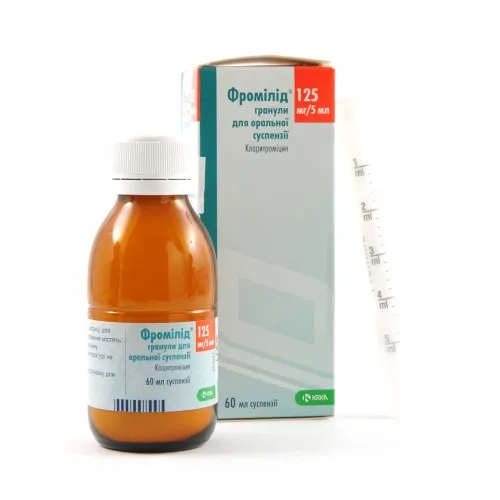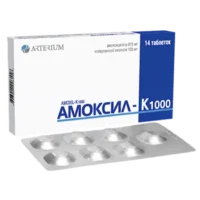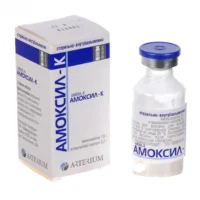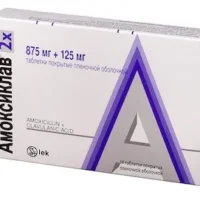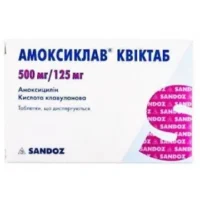Description
Fromilid Granules for Suspension 125 mg/5 ml. 60 ml. Oral Use
Ingredients:
Each 5 ml of suspension contains 125 mg of the active ingredient clarithromycin. Other ingredients include sucrose, xanthan gum, sodium citrate, citric acid, and more.
Mechanism of Action:
Clarithromycin, the active ingredient in Fromilid, is a macrolide antibiotic that inhibits bacterial protein synthesis by binding to the 50S ribosomal subunit. This action leads to the suppression of bacterial growth and ultimately, bacterial death.
Pharmacological Properties:
Fromilid exhibits bacteriostatic activity against a wide range of Gram-positive and Gram-negative bacteria. It penetrates well into tissues and achieves high concentrations at the site of infection, contributing to its efficacy in treating various bacterial infections.
Indications for Use:
Fromilid granules are indicated for the treatment of respiratory tract infections, skin and soft tissue infections, and Helicobacter pylori eradication. It is effective against bacteria such as Streptococcus pneumoniae, Haemophilus influenzae, and Mycoplasma pneumoniae.
Contraindications:
Avoid using Fromilid granules if you have a known allergy to clarithromycin or any macrolide antibiotics. Additionally, it is contraindicated in patients with a history of cholestatic jaundice or hepatic dysfunction associated with prior clarithromycin use.
Side Effects:
Common side effects of Fromilid may include gastrointestinal disturbances such as nausea, diarrhea, abdominal pain, and dyspepsia. In rare cases, severe adverse reactions like hepatotoxicity and allergic reactions can occur. Monitoring for side effects is important during treatment.
Usage Instructions:
Shake the suspension well before each use. The recommended dosage for adults and children over 12 years old is 250 mg (5 ml) twice daily. Dosage adjustments may be necessary based on the severity of the infection. Fromilid can be administered with or without food.
Benefits Compared to Analogues:
Fromilid has demonstrated comparable or superior efficacy to other macrolide antibiotics in clinical trials. Its once-daily dosing regimen offers convenience and improved patient adherence to treatment. The broad spectrum of activity of clarithromycin makes Fromilid a versatile choice for various bacterial infections.
Suitable Patient Groups:
Fromilid is suitable for use in both adults and children over 12 years old. Dosage adjustments may be required in elderly patients or those with renal impairment. Pediatric dosing should be based on the child’s weight and severity of the infection.
Storage and Shelf Life:
Store Fromilid granules for suspension in a cool, dry place away from direct sunlight. Keep the bottle tightly closed. The shelf life of the product is typically 24 months from the manufacturing date. Do not use the suspension after the expiration date.
Packaging Description:
Fromilid granules for suspension are supplied in a 60 ml bottle. The packaging should include a measuring device to ensure accurate dosing. The bottle should be child-resistant to prevent accidental ingestion by children.
Clinical Evidence and Proven Effectiveness:
Fromilid (clarithromycin) has been extensively studied in clinical trials for its efficacy in treating various bacterial infections. Research has shown that clarithromycin is highly effective in eradicating Helicobacter pylori, a common cause of gastric ulcers.
In comparative studies, Fromilid has shown similar or better effectiveness compared to other macrolide antibiotics. Its pharmacokinetic profile allows for convenient dosing regimens and good patient compliance.
Additional Information:
It is crucial to complete the full course of treatment with Fromilid granules as prescribed by your healthcare provider. Premature discontinuation of the antibiotic therapy may lead to treatment failure and the development of antibiotic resistance.
Prior to initiating treatment with Fromilid, inform your healthcare provider about any pre-existing medical conditions or medications you are taking to avoid potential drug interactions. Regular monitoring for side effects and therapeutic efficacy is essential during the course of treatment.

